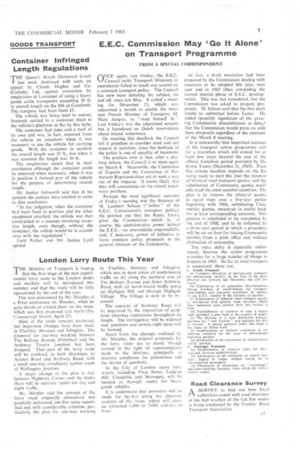E.E.C.Commission May 'Go It Alone' on Transport Programme
Page 9

If you've noticed an error in this article please click here to report it so we can fix it.
FROM A SPECIAL CORRESPONDENT
ONCE again, last Friday, the E.E.C. ‘-"Council (with Transport Ministers in attendance) failed to reach any accord on a common transport policy. The Council has now been debating the subject, on and off, since last May. It called a meeting for December 21, which was adjourned a month to enable the thennew French Minister of Transport, M. Marc Jacquet, to "read himself in ". Last Friday's was the adjourned session, but it foundered on Dutch reservations about inland waterways.
On meeting this deadlock the Council felt it pointless to consider road and rail aspects in isolation, since the bedrock of the policy is one of equality of treatment.
The position now is that, after a daylong debate, the Council is to meet again on March 8. Meanwhile, the Committee of Experts and the Committee of Permanent Representatives are to seek a way out of the impasse. It seems likely that they will concentrate on the inland waterways problem.
Perhaps the most significant outcome of Friday's meeting was the firmness of M. Lambert Schaus (" father of the E.E.C. Commission's transport policy). He pointed out that the Rome Trea:y gives the Commission—which is, of course, the administrative power behind the E.E.C.—an unavoidable responsibility and, if necessary, power of initiative to form common policy proposals in the general interests of the Community. In fact, a draft resolution had been prepared by the Commission dealing with measures to be adopted this year, next year and in 1965 (thus concluding the second interim phase of E.E.C. development). This was not considered, but the Commission was asked to prepare proposals. M. Schaus said that the first draft would be submitted before Easter. He added (possibly significant of the growing Commission dissatisfaction at delay) that the Commission would press on with these proposals regardless of the outcome of the March 8 meeting.
It is noteworthy that important sections of the transport action programme call for a transition which will extend for at least two years beyond the end of the official transition period provided by the Rome Treaty (December 31, 1969). Even this remote deadline depends on the .Six being ready to start this year the removal of bilateral road transport quotas, and the substitution of Community quotas available to all the other member countries. The plan is to remove the bilateral quotas in equal steps over a five-year period beginning with 1964, substituting Community quotas, measured in useful load. for at least corresponding amounts. This process is scheduled to be completed by the end of I968, andto be followed by a three-year period in which a procedure will be set on foot for iisuing Community permits from a joint office and without distinction of nationality.
The extra delay, is especially unfortunate, because the action programme provides for a large number of things to happen in 1963. So far as road transport is concerned, these are:
















































































































































































